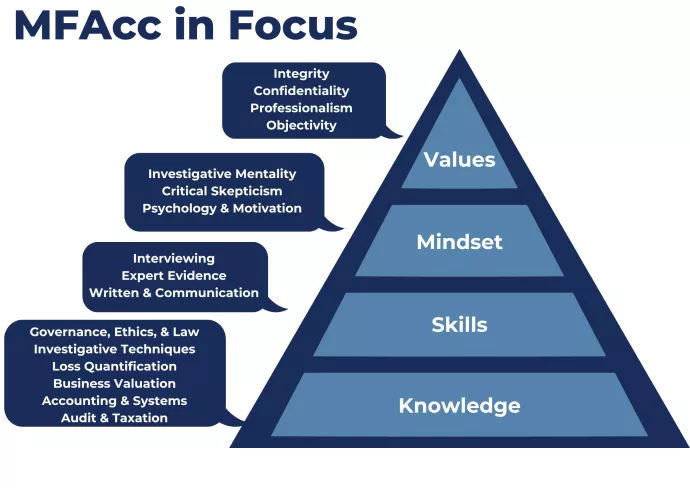» The MFAcc Program educates Forensic Accountants to look beyond the numbers and deal with the business realities of situations.

» Background
The growing complexity of personal and organizational interactions and an increased appetite for formalized methods of dispute resolution have combined to heighten the need for accountants skilled in investigation and resolution of financial disputes in both civil and legal proceedings. Investigative and forensic accounting involves the rigorous investigation of the financial aspects of a particular situation, usually with the objective of establishing evidence relating to possible or pending criminal or civil legal proceedings. It involves the investigation of situations where "white collar" crime is suspected and also those where a dispute needs to be resolved.

Fraud, money laundering, supplier kickbacks and other examples of "white collar" crime represent a serious threat to business competitiveness. Accountants are increasingly involved with the investigation of these activities and of the investigation of economic losses due to damages to businesses, property or personal injury. While the demand for forensic accountants has been said to be increasing significantly each year, there is a dearth of university courses and programs designed to educate forensic accountants.
The IFA practitioner requires a broad range of knowledge and skills to carry out financial investigations. These include: accounting, audit, and income tax knowledge; fraud knowledge; knowledge of law and rules of evidence; an investigative mentality and critical skepticism; understanding of psychology and motivation; and, strong communication skills.
Forensic Accounting means "suitable for use in a court of law", and it is to that standard and potential outcome that forensic accountants generally have to work to. Forensic accountants often have to give expert evidence at trials.
» Curriculum
The Master of Forensic Accounting (MFAcc) program is designed to provide a graduate professional accountant, or equivalent, with the skills, knowledge, insights and professional characteristics necessary to successfully respond effectively to:
the challenges of investigating fraud, other aspects of white-collar crime, money laundering, and other financial disputes, and
the provision of reports, advice and evidence to clients, lawyers and courts for the resolution of situations relating to possible or pending civil or criminal legal proceedings.
» Courses
Students enrolling in the MFAcc are required to complete 10 graduate half-course credits, taken sequentially, over a 24-month period.
MFAcc courses will be delivered part-time, one evening per week, over a period of two years, using ZOOM, except for the final course in the program, which requires a one week residency.
Throughout your studies in MFAcc, problem-based learning will be used to facilitate an interactive learning program. Course sessions are Online Synchronous.
» Learning Approach
Problem-based Distance Learning
The MFAcc Program is primarily offered in a part time online, interactive learning format designed to be accessible and convenient for the working professional, whether international or domestic. There is a short on-campus residency session at the end of the program. It provides an exposure to experts as a capstone experience to the entire program. The residency also helps build a support network that will extend through your entire academic experience and professional career.
The online format delivers a ‘real time’ interactive lecture component, where enhanced learning levels are achieved through the use of complex, practical problems or cases. Students are given pre-session readings with pre-assigned problems to be discussed and solved by 4-5 person study groups through email or group discussion software. Learning at an enhanced, professional level will also be facilitated through individual and group assignments as well as a final exam for each course.
The problems or cases used will afford the student with an ability to work through useful situations that will enhance their appreciation of the skills, knowledge, insights and professional characteristics required for an effective, professional resolution. Study groups will be formed from students with complementary experience and professional backgrounds. Access to experts online will facilitate the learning process, as will discussion of these cases with the student's study group members.
“The Program presents a well-rounded and in depth learning experience for anyone seeking to enhance their knowledge in the field of Forensic Accounting. However, it also presents non-practitioners with a forum to hone their investigative questioning, reasoning, logic and strategy skills which is unarguably one of the key tools in today’s work environment.” Wade Pinder, Senior Director. DIFA Graduate
Examinations
Special procedures will be put in place to ensure that tests and examinations for the online courses are written in properly supervised conditions in the city in which the student resides.
MFAcc YEAR 1 |
IFA1900H › Forensic Accounting & Investigation, Fraud & Cybercrime › { Sep-Oct }
IFA1905H › Fraud Prevention, Risk Assessment & Investigation, Data Analytics & Security › { Nov-Dec }
IFA1906H › Money Laundering, Asset Tracing & Recovery, International Aspects of Fraud › { Jan-Mar }
IFA1901H › Forensic Accounting Professional & Practice Issues › { Mar-May }
IFA1907H › Legal & Legal Process Issues for Forensic Accountants › { May-Jul }
MFAcc YEAR 2 |
